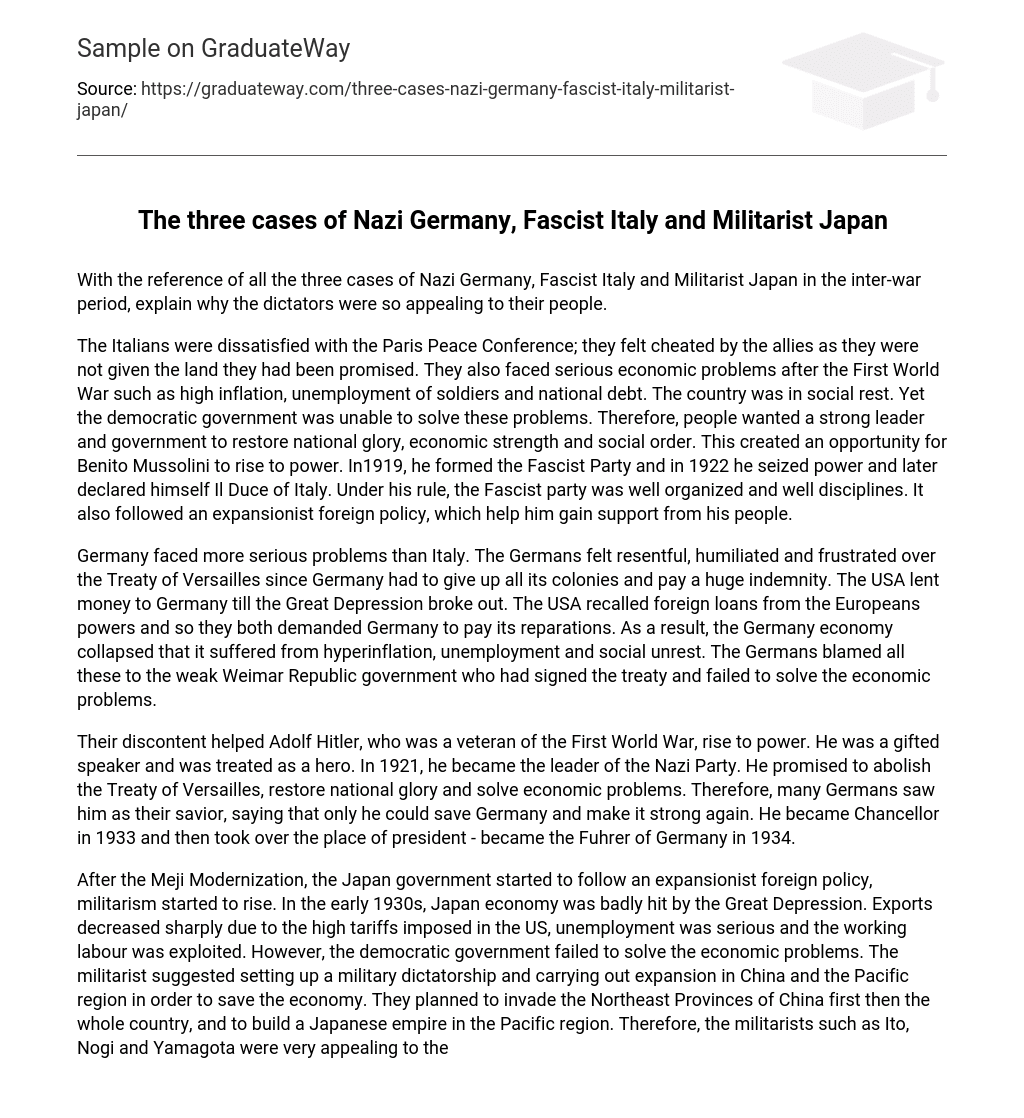With the reference of all the three cases of Nazi Germany, Fascist Italy and Militarist Japan in the inter-war period, explain why the dictators were so appealing to their people.
The Italians were dissatisfied with the Paris Peace Conference; they felt cheated by the allies as they were not given the land they had been promised. They also faced serious economic problems after the First World War such as high inflation, unemployment of soldiers and national debt. The country was in social rest. Yet the democratic government was unable to solve these problems. Therefore, people wanted a strong leader and government to restore national glory, economic strength and social order. This created an opportunity for Benito Mussolini to rise to power. In1919, he formed the Fascist Party and in 1922 he seized power and later declared himself Il Duce of Italy. Under his rule, the Fascist party was well organized and well disciplines. It also followed an expansionist foreign policy, which help him gain support from his people.
Germany faced more serious problems than Italy. The Germans felt resentful, humiliated and frustrated over the Treaty of Versailles since Germany had to give up all its colonies and pay a huge indemnity. The USA lent money to Germany till the Great Depression broke out. The USA recalled foreign loans from the Europeans powers and so they both demanded Germany to pay its reparations. As a result, the Germany economy collapsed that it suffered from hyperinflation, unemployment and social unrest. The Germans blamed all these to the weak Weimar Republic government who had signed the treaty and failed to solve the economic problems.
Their discontent helped Adolf Hitler, who was a veteran of the First World War, rise to power. He was a gifted speaker and was treated as a hero. In 1921, he became the leader of the Nazi Party. He promised to abolish the Treaty of Versailles, restore national glory and solve economic problems. Therefore, many Germans saw him as their savior, saying that only he could save Germany and make it strong again. He became Chancellor in 1933 and then took over the place of president – became the Fuhrer of Germany in 1934.
After the Meji Modernization, the Japan government started to follow an expansionist foreign policy, militarism started to rise. In the early 1930s, Japan economy was badly hit by the Great Depression. Exports decreased sharply due to the high tariffs imposed in the US, unemployment was serious and the working labour was exploited. However, the democratic government failed to solve the economic problems. The militarist suggested setting up a military dictatorship and carrying out expansion in China and the Pacific region in order to save the economy. They planned to invade the Northeast Provinces of China first then the whole country, and to build a Japanese empire in the Pacific region. Therefore, the militarists such as Ito, Nogi and Yamagota were very appealing to the Japanese because they were making Japan the dominating power in the world and improving the economy.
In conclusion, the Fascist Italy, the Nazi Germany and the Militarist Japan faced these common problems – bad economy, unemployment and a weak government – that helped the dictators rise to power. First, they understood the needs of people. They gave speeches to people and promised them to solve the socio-economic problems. They also made use of propaganda to promote their ideas. Second, as the original governments were not functioning well, they could be overthrown easily. Third, these countries all followed an expansionist foreign policy which claimed to be glorifying wars and help solve those economic problems. As a result, they were very appealing to the people and gained support from them. Eventually, Italy, Germany and Japan were turned into totalitarian states, which were against liberalism, democracy and individualism.





